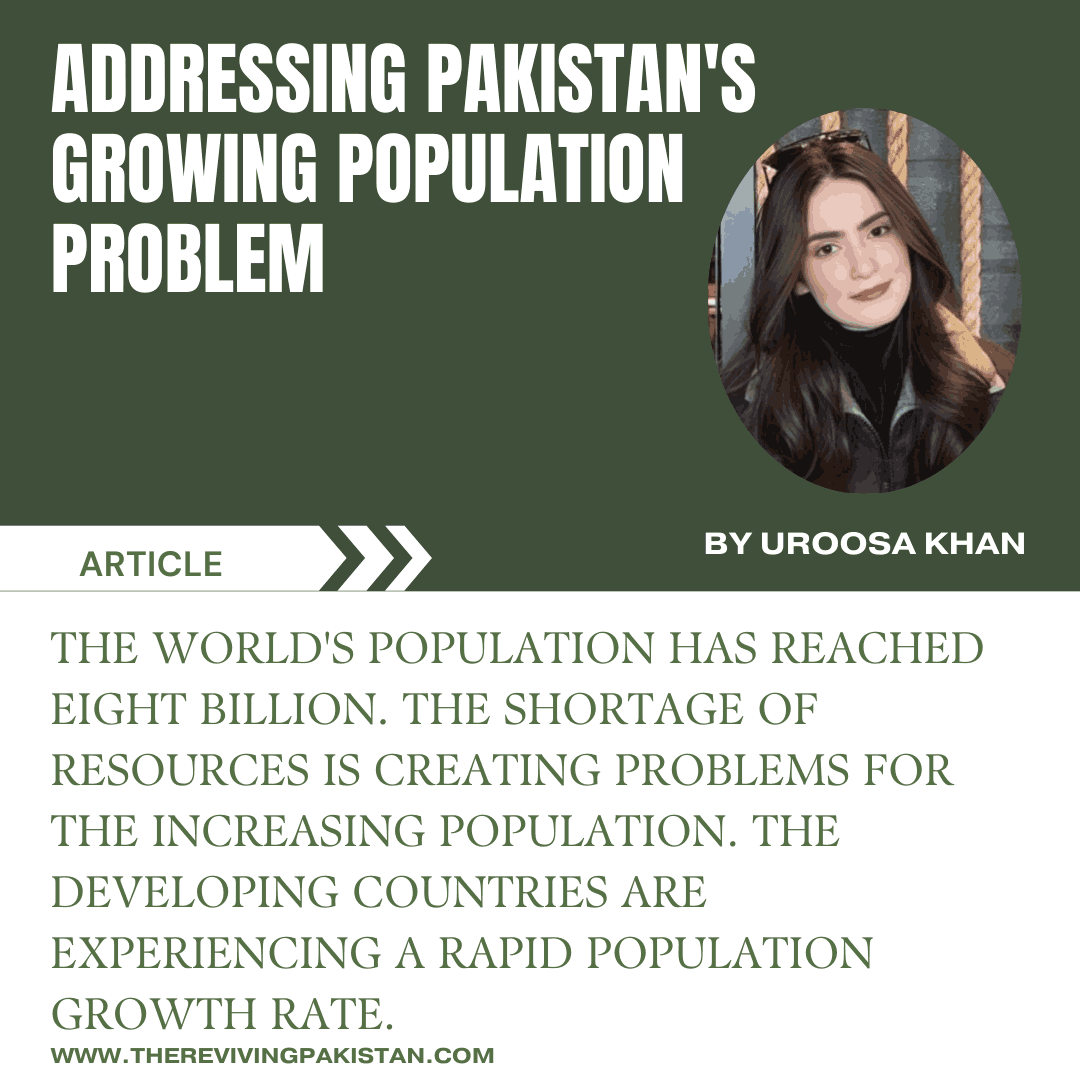About the Author(s)

Uroosa Khan
The author is an independent researcher having keen interest in foreign policy, geopolitics, and international relations.
The world’s population has reached eight billion. The shortage of resources is creating problems for the increasing population. The developing countries are experiencing a rapid population growth rate. Pakistan is one of the countries where the population is rapidly increasing. According to the latest estimations, Pakistan’s population is 240 million; this makes Pakistan the 5th largest populated country in the world. The population is growing at the rate of 2.55%.
Thus, it is one of the most pressing problems faced by the country since the last several decades. The high growth rate of population has deep economic, social, psychological, and political roots. Pakistan is one of the countries vulnerable to climate change and water shortage. Therefore, the increasing population is creating grave trouble in different sectors.
A host of factors are behind the rapid increase in population. For instance, lack of family planning, social and cultural norms and values, a dominant patriarchal system, illiteracy, lapses in foreign policy, inconsistency of successive governments, economic factors, urbanization, role of clergy, etc. Hence, it has a profound impact on issues such as unemployment, constrained natural resources, food security, environmental degradation, a burden on social services, healthcare challenges, poverty, migration pressure, cultural and social dynamics, and educational challenges.
Such high growth in population is consuming the serenity of the natural environment of the societies. Their residences are getting congested. The crime rates and social deviancy are raising plaintiffs. Youth and juvenile delinquency is escalating. The unemployment rate is surfacing as a result of a demand and supply gap between needs and wants of employment. Over half of the graduate population is unemployed due to this rising population, which compresses job opportunities. Due to the lack of proper health facilities, mortality rates are growing. On the dichotomous side, the overpopulation further burdens the degraded and weak structure of healthcare.
Over 23 million children are out of school. The tremendous increase in population and the existing educational institutes, teachers and facilities are not sufficient to assimilate the resultantly emerging students. Pakistan is already a water-scarce country. And the increasing number of inhabitants in the country would pose great challenges in terms of adequate water availability per person.
Thus, it is hard not to agree that the ballooning population is a major threat Pakistan is facing. On the other hand, proactive steps have to be taken in regard to overcoming the population problem of Pakistan. The intelligentsia, civil society, religious clergy, government, and local influencers have key roles to play in order to surmount the problem of overpopulation in Pakistan. The government of Pakistan should take the population control policy as an agenda for decision making.
Family planning should be strengthened by the government. And contraceptive measures should be easily available, more so in the rural areas of the country. Awareness campaigns regarding the negative impacts of an overblown population in a society should be held on a regular basis. Creative and entertaining social marketing campaigns must be launched for family planning. Family planning, as a part and parcel of healthcare programs, can execute and make more people aware about the ways of family planning. Advertise through television, radio, social media, and other mediums on family planning and small families.
The government should conduct training for healthcare workers and spread awareness locally regarding population control measures. Investment in the education system would bring consciousness and awareness among women. An educated woman is definitely able to change the fate of society by bringing awareness about family planning. Furthermore, it is highly essential to have comprehensive sex education in schools so that the students can be fully made aware of their reproductive health. As well as measures of population control.
Effective policies at the national level regarding the ballooning population should ensure that society is developed in a manner that is sustainable. Demonstrate political will and commitment to putting population control at the forefront of national development plans. Set up monitoring mechanisms that are able to evaluate the effectiveness of programs and policies on population control. Involve community and religious leaders in population control policy decision-making processes and elicit their support in advocating for family planning to their followers.
Bold steps should be taken by the government for women empowerment, which may help prevent patriarchal dominance. And rigid social and cultural barriers that restrict a woman from having a say in her reproductive rights.
Social welfare programs should be initiated to prevent poverty, as poverty is one among the reasons attributed to rising population. It is countries like Bangladesh, China, Indonesia, Thailand, and so many others that have taken remedial measures to solve the population problem and set an example for Pakistan as well.
Unless productive usage for this ever-increasing population is made, it is going to remain a burden instead of an advantage for Pakistan. Steps are needed to rectify the matter not only for the betterment of our people’s and our country’s future as well.
Population control policies must be implemented fully in letter and spirit. The Prime Minister should activate the four Chief Ministers on the Council of Common Interest platform for the implementation of the population control policy. All big political parties relevant to this initiative and religious clergy should support this initiative for betterment in our society and a sustained future for our generations.

